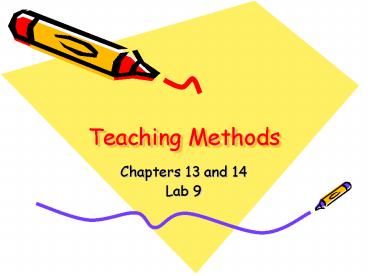Teaching Methods - PowerPoint PPT Presentation
1 / 38
Title: Teaching Methods
1
Teaching Methods
- Chapters 13 and 14
- Lab 9
2
4 Approaches Covered
- 1. Direct Instruction, expository approaches
- 2. Constructivist approaches-discovery learning
- 3. Humanistic approach-student centered learning
- 4. Cooperative Learning
3
Direct Instruction
- 1. all classroom activity is on learning academic
knowledge and skills. - 2. teacher makes all decisions
- 3. students are to remain on task as much as
possible - 4. classrooms managed by rf, few aversive
consequences.
4
Phases of Direction Instruction
- Orientation, presentation, practice
5
Phases of Direct Instruction
- 1. Orientation overview of the lesson
- WHY they need to learn the material
- Relate the new material to earlier lessons or
their life experience - Informs them of the level of performance they
need
6
2. Presentation
- Explaining, illustrating, and demonstrating the
new material. - Broken into steps for mastery of the concepts.
- Should provide numerous examples.
7
Components
- 1. small units.
- 2. logical sequence.
- 3. master each unit.
- 4. concrete, observable criterion for mastery of
unit. - 5. remedial help available.
8
Mastery learning
- Must master one topic before moving to next
- Good for math, foundational concepts
- Appropriate for anything hierarchical
9
Help Students Take Notes
- Use good blackboard technique.
- Tell children when to take notes.
10
Check for Understanding
- Taking the temperature of the group
- --Choral response
- --select children on different levels
- --random calling on, but not as disciplinary
technique - --use volunteers (least effective)
11
3. Practice
- Purpose to allow children to practice skill so
they can do it alone - To clear up misunderstandings following the
explanation.
12
a. Structured Practice
- Teacher leads whole class through each step in a
problem - MINIMIZE incorrect responses
13
How to conduct a structured practice session
- Have a number of questions planned before you
start - Make sure all the students answer in some way
- Increase the cognitive level of questions
14
Wait-Times
- Wait-time I
- Interval before students respond
- Wait-time II
- Amount of time between the childs response and
the teachers answer
15
Directing Questioning
- Dont use volunteers more than 10-15 of the time
- Call on students in a patterned order
- Random call-ons create anxiety
- Call name first, then ask question
16
Handling incorrect responses
- First, confirm if part was correct
- Probing means breaking the question down (provide
scaffolding) - Dont praise wrong answersmaybe the effort (nice
try, but ) - Repeat correct answer when you get it
17
b. Guided Practice (seatwork)
- Children work on papers or worksheets on their
own - Texts, workbooks, silent reading
18
Purposes of Seatwork
- Provide practice time with teacher available for
scaffolding - Provide something for the children to do while
the teacher is engaged elsewhere
19
Seatwork
- Children spend between 50-75 of the day in
seatwork - May automatize undetected errors
- Least engaged time
20
Seatwork Management
- Have list of seatwork items as EXTERNAL MEDIATOR
- Circulate among students during seatwork
- Aim for contacts of lt30 seconds
- Remember the importance of room arrangement
21
Effective Seatwork
- effective teachers
- Spend more time in demonstrations, guided
practice prior to - Demonstrates a few problems
- Seatwork directly follows instruction
22
Management continued
- Have established routines for
- when you are finished where to put your
work - what to do if you finish early
- when you have questions about directions
- May use external mediation peers
23
c. Independent Practice
- Research shows that this is when children are
- least engaged
- most prone to errors
- likely to become confused.
24
Research on Hmwk
- Not correlated w/ achievement until about JHS
- Probably no benefit for el ed
- Often more correlated with parental skills than
child skills
25
Homework
- Assignments to be done at home.
- Required in most districts starting in
kindergarten. - Suffers from more errors and poor engagement
rates than seatwork.
26
El Ed Effective Homework
- Should hone childs study skills
- Have the children practice things you know they
can do. - Focus on creativity.
- Plan what parents should do.
27
Effective Homework
- Have children practice study skills
- --highlighting
- --taking notes
- --outlining chapters
- --summarizing information
28
Effective Homework
- Never give a new assignment
- Break a large assignment into pieces (such as a
book report)
29
Constructivist Approaches
- Individualized Instruction
- Discovery Learning, Cooperative Lrn
30
a. Individualized instruction
- Goals, objectives, pace of instruction,
assessment all determined by student - Works well for highly motivated students
31
Individualized Instruction
- Not superior to direct instruction
- Depends heavily on student motivation
32
b. Cooperative Learning Groups
- Purpose
- Children work in groups to create a product.
- Usually mixed ability grouping
- Children learn to work together scaffold each
other.
33
Disadvantages
- Dominant personalities can dominate the work
- Not all children are able work at an equal level
- Difficult to grade fairly
34
Improving Cooperative Learning
- Choose the topic carefully
- Choose the size and composition of the group
- Assign roles that are equal in importance but
depend on different skills - Dont grade
35
Does Co-op work?
- More effective than non-coop in raising
achievement, motivation, positive social
outcomes - Students more likely to name a classmate from
other race, ethnicity, social class as Nice or
Smart
36
c. Discovery learning
- Should include how ideas connect w/ one another
- How to frame problems
- Asking appropriate questions
37
Teachers Role in Discover Lrn.
- Provides stimulating activity
- Answer student questions
38
Advantages of Dis Lrn
- Works well in sciences
- Works best w/ motivated learners
- Probably guided discovery learning is best































